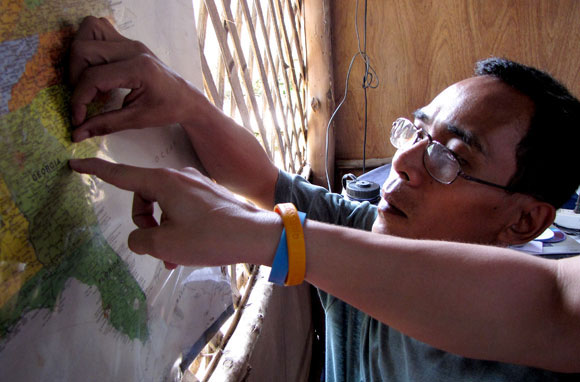From toilets to doorknobs, brief training tries to help refugees adjust
By Julia Lyon | The Salt Lake Tribune
After a lifetime in bamboo huts, miles from a modern city, thousands of Burmese refugees who arrive in the U.S. are unfamiliar with having electricity -- let alone getting a utility bill.
Some have never encountered a doorknob or held a pen.
The U.S. offers about five days of cultural orientation to prepare them for life in America -- where most are expected to immediately start work and quickly become self-sufficient.
A chorus of critics says that is not enough. “It’s a disaster now,” said Jen Smyers, an advocate with Church World Service’s refugee program in Washington, D.C. She says Burmese refugees have flown across the world not understanding they could eat the food on the plane.
The limits of lectures » This fall, the International Rescue Committee is revamping the orientation program in Thailand. It is reviewing the curriculum, which may be expanded to include more focus on diversity and more information on reproductive health.
Still, no class can cover everything. Years ago, refugees from Vietnam and Laos who were headed to America were first taken to the Philippines and given lessons on topics from the use of appliances to English vocabulary.
But the southeast Asian refugees still panicked in America, when they felt “pins and needles” for the first time as their cold fingers warmed up during winter.
“You can expose people to certain aspects of the culture, but it’s not until they have to engage with it 24 hours a day that you see some of the changes,” said Larry Yungk, a former caseworker who now works with the United Nations High Commissioner for Refugees. “There’s only so much you can do.”
Sketches of a new world » At Mae La, the largest refugee camp in Thailand, bulletin boards this fall attempted to educate refugees about life in the United States. A drawing demonstrated how to sit properly on a Western-style toilet. An illustration tried to get across that polygamy is not allowed.


Just days before leaving for his new life in America, Burmese refugee Nay Lwin, 44, studies a U.S. map to discover where his new life will begin in Georgia. He had attended a course about traveling to America held at Mae La refugee camp in Thailand. (Julia Lyon / The Salt Lake Tribune)
Some refugees have had little formal education. The Karenni language, which is spoken by some Burmese refugees now arriving in the U.S., has existed in written form for only a few decades, meaning many people cannot read in their native language.
During orientations, officials have noted that many Karenni refugees assume the free food, housing and health care available in the camps will continue in the U.S. Told they will have to work, many are stunned and become uninterested in leaving.
Just days before leaving for America this fall, Burmese refugees learned how to open the door of an airplane bathroom and use seat belts. They were given a piece of paper they could hold up if they needed help changing planes.
Some could not recall the name of the state where they would reside. But in that moment, as they studied the map of America, their smiles were huge.
“I am very happy,” said Nay Lwin, 44, who was moving with his wife and daughter to Georgia. This will be “a new life.”

